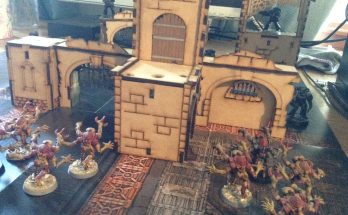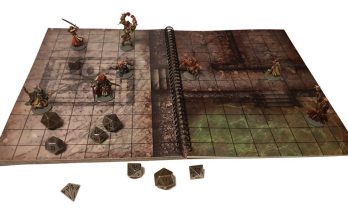The next Playtest Packet is out! Here’s my jotted down first impression scribblings as I skim-read through it. Expect a more detailed overview Real Soon.
- Critical Hits now do maximum damage PLUS 2d6 for players and creatures with class levels, and that scales with level. This makes Crits much more lethal if you’re a player, and boss fights potentially more dangerous too. I think I like that.
- The Level Advancement table goes up to 10, and includes XP (which is still silly low, I’m guessing purely for playtest purposes), as well as Benefits. PCs get a new Feat at 3,6,9, Skill Bonus at 2,4,6 and 8, and +1 to two ability scores at 4 and 8. That’s what I expected it would be, but disappointed that leaves dead levels at 5 and 7.
- Very pleased that Skills are explicitly no longer linked to certain Attributes. Glad that’s clarified properly. The skill details just say “The _________ skill typically applies to a ________ check”. I like the freedom to use Skills in inventive ways, and the descriptions provide good guidance, nothing more.
- The Bestiary is AWESOME. It integrates the monsters from Caves of Chaos, Isle of Dread and Blingdenstone (which are also included), and adds more into the list too. just eyeballing quickly, it looks like they have done great work sorting out the levels and XP throughout, though playtesting will be needed to check that. There are three Huge Dragons (Black, Green, White). Anyone want to fight a Dragon?
- Fixed damage option for monster attacks. Interesting, reduces the number of dice a DM has to roll. Could be a good thing for large number of monsters or to speed up play. I like, and could see myself using it sometimes.
- Mind Flayer. Holy cow! Wow.
- Dwarves are no longer immune to poison! They have advantage on the saves, and are resistant (taking half damage). That’s a fair change. Full immunity could potentially be OP.
- Elven Keen Sense now gives Training in Spot and Listen (which is nice), but not Advantage. Makes sense, as Advantage could be gained from another source, whereas Training is always useful.
- Halflings now taste of lamb, not chicken. I much prefer chicken-flavoured Halflings. This is a step backward, imho.
- Wizard Traditions are uninspiring and boring. I want (and expected) Traditions to be flavour-filled packets of awesome that make each Tradition unique and tempting to play. Bundles of Cantrips and being able to cast one spell more frequently? Not exciting. Zzzzzzzzzzzzzzz. Sorry, Wizards of The Coast. I know you can do better. The new Cleric Deity rules prove you can do better. I quite like those.
- Rogues and Fighters rock so hard. That is all.
And I’m done until I’ve read it in more detail. Good stuff.




I’m surprised by your comment on Elven Keen Sense, as I view that in exactly the opposite light: there are plenty of other ways to get training in Listen and Spot (Backgrounds, Skill Specialist, rogue schemes), but easy ways to get advantage on a particular type of skill check seem less common or less constant to me.
If it IS easy to get advantage on those skill checks, though, then I agree that would need to change. My main problem with the advantage mechanic (which I otherwise adore) is that it is not granular enough. I’d be good with defining it as the “lesser” of two grades of benefit or the “greater” of two grades of benefit, but I think that having only benefit or not-benefit is not enough – there are too many possible factors that could aid a roll.
Speaking as a DM, I prefer the Advantage/Disadvantage to be something I can use at the game table to quickly reward (or make more difficult!) PCs actions in play, rather than a mechanic which they gain during character generation.
For example, if I player said their character was going to carefully search for traps and describe how they were going to di it, I would give them Advantage on the roll. Likewise if they just said they were watching out for them as they ran past, I’d give them Disadvantage.
In the previous version of Keen Senses, giving Advantage to an Elf’s checks was pointless as they already had it, and Disadvantage just meant an Elf was an good as a human looking for stuff normally. That’s ok, but not great.
Giving Elves Training in Listen and Spot (I would much rather there was a single Perception skill, personally) means that the PC can pick up a different skill in their place if Listen/Spot is in their Trained Skill list, and I can use the Advantage/Disadvantage mechanic at the table without the Elf player feeling like I’m short-changing them. That means greater diversity in skills for Elf characters, and one happier GM. It’s a win all round.
I am confused on one thing, and this may have to do with me not having read in close enough detail: you mention that the PC can pick up a different skill in place of Listen and Spot. Is this a thing? I had interpreted the Scheme and Background lists as fixed, “you get all of these and nothing else” rather than options. (Barring DM intervention, which is my planned solution should the problem ever arise.) From that assumption on my part, I feel like it steers elves away from Backgrounds and Schemes with those skills.
In re: your other points, agreed. I think it’s important that the game define a bunch of different ways to modify rolls that still don’t bog down play in an endless list of if/thens (this is one of the few things in 4e that really aggravates me).
And on your desire for a single Perception skill rather than Spot and Listen: sing it, brother. =)
It’s in the Backgrounds and Sills document under Training, 1st column:
“If your character already has training in a skill and gains training in that skill again (for example, a skill granted by both the character’s class and background), you instead choose a different skill in which your character becomes trained.”
Good to know, thanks!
Advantage on a skill check is useful if you are trained or not. However, since advantage is a strong bonus, it can be a bit overwhelming. This is what they get by reducing flexible bonuses to the concept of advantage.
I looked through this trying to convert one rogue I had made, but we hadn’t started playing yet. It’s annoying trying to figure out combos that give you the skills you want rather than just buying skills.
I have to admit, I’m not as excited about this version. The specialties are so tied now to classes, I think, especially the Arcane specialist. If you’re not otherwise a caster, I can’t even imagine how it would be useful. At level 6 you maximize, what? Mage hand? This is such a bummer when the last revision allowed for a really easy hybrid-classing. And what about Cure Minor Wounds made anyone think “Heal 1 HP? Too powerful, how can we nerf this?”
So much good, interesting stuff, but this is the first playtest packet where I’ve though “What in the world are they thinking?”
Geoff,
I’d like to point out that the limitation on Cure Minor is necessary given that a number of deities grant the spell as an at-will effect – if it were not thus limited, it would be tantamount to free healing between encounters. There might be better ways to limit that, but this is, all in all, a pretty good one.
I’m totally with you on Arcane Magic Specialist, though. They closed the door to some really interesting possibilities there. (Much as they did with making thieves’ tools necessary to trap-disarming, and making the Rogue class the only way to gain proficiency with thieves’ tools. Personally, I love the idea of a tinkering wizard or fighter-with-tools handling the traps that the party comes across, particularly if there’s no rogue in the party to handle them. To put that another way, I don’t want the Four-Man-Band to be mandatory to handle challenges – I’d like all kinds of different combinations to be good enough, especially if someone is willing to spend their Specialty, Background, or multiclassing to cover that base. …also, I ramble a bit.
Of course some of this might be part of the playtest procedure. “Let’s add some flexibility, then take some away and see how people react.”
I could also see it as an attempt to relegate specialists to more of a ‘flavor’ instead of a real hybrid giving the Arcane specialist a flavor of a caster, or the divine the flavor of a cleric, but in both situations they created specialties that are really only viable for those classes. A wrong step, IMO. I can’t really see what they’re trying to do there. Are specialties SUPPOSED to be specific for classes? Listed in a big group, but really they don’t intend for a fighter to take Arcane Specialist, or a mage to take stealth or ambusher (though I can see useful stuff there, they just kind of killed casting hybridization this go around for some odd reason).
That being said, maybe they intend to do hybrids through 3rd ed style multiclassing, and we still haven’t see any kind of multi-classing rules, so I’m wondering if that’s where they’re going.
The other thing to consider, at least for me, is that the specialists seem overpowered. That is, they’re not power-neutral, and all provide a distinct (if variable) advantage over someone that doesn’t use them. If they’re going for a game that cam be played a different levels by different players at the same table (which I thought I remember them saying was a goal), Specialties and Backgrounds are going to give real advantages. I’m still waiting for them both to have some real negatives as well as the positives for your choices there to balance things out a little better.